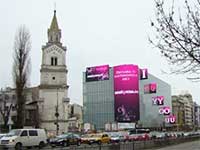Google-Future
Russia is rich in talents which it loses wastefully and rashly. Probably the most obvious example of it is the founder of the Google Corporation. He left Russia and a few years later established a company that grew to be a gigantic empire.
 Google X Secret Lab
Google X Secret LabGoogle today is not a standard company but a new business model, a structure that outgrew one country, an ideologically new development trend, a well-planned organizational strategy and unique corporate culture.
Google is changing the rules of business practice, conquers new business areas, regularly throws in innovative ideas and opens new markets. In fact, Google came up with the new concept of disruptive innovation. Over the last several years Google became an inexhaustible source of technological innovations and frequently goes head of the global market tendencies.
Certainly Google is mostly associated with the Internet technologies, software innovations, search engines and on-line translation. But Google today actively develops not only IT projects but hardware solutions as well. This is primarily due to the fact that the Internet and IT are moving fast into the world of things.
For example, the Android platform today is installed not only in smartphones and tablets but in cars and portable devices. Google X has already initiated the self-navigating robot cars on the basis of the existing Google Maps, Google Earth, and Street View platforms, launched tests of contact lenses for diabetics with the microchip and sensor to continuously monitor sugar level.
 Google X project with Makani Power
Google X project with Makani PowerRecently the company announced a unique project on generation of ecologically pure and cheap electrical energy. New ideas and projects are announced by the company almost daily. But the Google of 2016 this is insufficient and rather shallow. Recently the Executive Chairman Eric Schmidt made known the global mission of Google that aims at nothing less than “management of the global information”.
It may not be easy to organize such an enormous project. But Google has already transcended the US borders and is operating globally, including in Russia. And the company achieves this in a very efficient manner. Recently an important event organized by Google attracted more than six thousand bright minds. It was the annual exhibition/ conference Google I/O 2016 in Mountain View where participants from many countries who work on Google-sponsored projects were invited.
It means that the company is gradually forming a wide Google-community that in future will turn into the powerful technological and intellectual lobby around the world. In many countries and in most largest cities Google established so called GDGs (Google Developer Groups), that bring together bright well-educated students, engineers, developers and managers.
GDG communities form an exterritorial group of influence that is capable to supply Google with the best specialists from different countries, solve additional tasks during development of new Google applications, become active force in promoting Google solutions. For young people such events is an excellent place to start a career, receive support from Google community, broadcast their innovative ideas. In a way, we are all moving together into the bright future indicated to us by Sergey Brin.
 Google bus protest
Google bus protestBut not everyone shares the euphoria. Gradually and anti-Google movement is taking shape among people who refuse to share ideas of this globalistic corporation. Douglas Rushkoff who recently published a bestseller “Throwing Rocks at the Google Bus: How Growth Became the Enemy of Prosperity” tries to give us the levelheaded view of the events. In fact, the book is a warning to mankind voiced by the author who doubts the validity of the economic model selected by Google.
Why doesn't the explosive growth of companies like Facebook and Uber deliver more prosperity everywhere in the world? Is there a systemic problem of the economic growth that sets the rich against the poor and the technocrats against general population? The title of the book is related to the incident at the end of 2013 when protesters against placing technological companies in San-Francisco Bay and Oakland areas blocked shuttle busses carrying Google employees to work and shattered some of the bus windows with rocks.
The anger of the protesters may have been justifiable, but it was misdirected. The true conflict of our generation isn't between the unemployed and the digital elite. Rather, a torrent of technological innovations has spun the economic programs of all developed countries out of control.
Everyone: protesters, Google employees, Google shareholders and executives – all became hostages to the consequences of the new economic policy. That is why the well-known author is trying his best to analyze the situation and tie together disparate threads and tendencies - big data, the rise of robots and AI, the increasing participation of algorithms in stock market trading, the gig economy, the collapse of the Eurozone.
The question though remains unanswered: what tendencies will finally prevail and whether the Google Corporation so much focused on the future remain our guiding start at this turbulent time.





